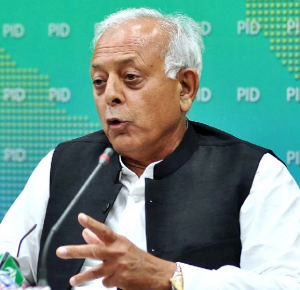A former minister’s remark in the National Assembly is being blamed for the PIA ban.
Sarwar had informed the parliamentary body that 150 pilots employed by the national carrier possessed “dubious licenses.”

ISLAMABAD: Ghulam Sarwar Khan, a former aviation minister, was blamed by the National Assembly Standing Committee on Aviation on Monday for the financial difficulties of Pakistan International Airlines (PIA) and the international travel ban that several nations, including the US and the UK, have placed on the airline.
The committee members bemoaned that the national carrier had to endure “irreparable harm” as a result of the former federal minister’s remarks in the National Assembly during a meeting presided over by Syed Mobeen Ahmed.
The panel claimed that the former minister’s “mindlessness” and “disregard for the national interest” were to blame for the state entity’s continuing problems and claimed that the speech “damaged the backbone of the national institution.”
After its aircraft PK-8303 crashed in Karachi on May 22, 2020, and the subsequent statement by the then-aviation minister Ghulam Sarwar Khan that 262 airline pilots had been grounded for allegedly skipping their tests, the PIA found itself in hot water.
150 pilots employed by the national carrier had “dubious licences,” according to information Sarwar provided before parliament.
During Monday’s meeting, the committee bemoaned the “poor reputation” that had hampered its flying operations to Europe and expressed its concern over pilots who had obtained bogus degrees.
The committee instructed the aviation ministry to present a thorough report on air activity in Europe at the following meeting.
The committee also instructed the ministry to provide a report regarding the Boeing 777 aircraft, which was impounded at Malaysia’s Kuala Lumpur Airport due to unpaid aircraft lease obligations.
The panel was informed of the occurrence earlier this year in which the captain of PIA aircraft PK-368 with a destination of Islamabad permitted a passenger to spend a significant amount of time in the cockpit, endangering the safety of all passengers.
The committee members were informed by representatives of the national airlines that the passenger in question was actually a PIA employee who was qualified and given permission by the captain to travel on the flight deck in accordance with sections 14.1.2 and 14.3.2 of the Operational Manual (OMA) of the Pakistan Civil Aviation Authority.
He claimed that neither national nor international laws were broken during the aforementioned event. The committee decided to scrap the agenda as a result.
The committee had previously received a briefing from the secretary of the aviation ministry on how the ministry of aviation and its related ministries operate.
He informed the committee that the goal of the ministry was to establish an infrastructure for a safe, secure, effective, appropriate, cost-effective, and well-coordinated civil air transport service in Pakistan as well as to promote and regulate civil aviation activities.
Strategy, policy, and oversight are the three key forces that will guide the pursuit of this objective. The National Aviation Policy 2019 has emerged as the first stage in the evolution of aviation under the broad strokes of their approach. According to him, the ministry of aviation will be established on April 19, 2022, after becoming an independent division under the cabinet secretariat in June 2013.
The ministry directs strategy, policy, and oversight for all issues relating to civil aviation for the Pakistan Meteorological Department, Pakistan International Airlines, Airport Security Force (ASF), and Civil Aviation Authority (CAA).
He went on to explain that the ministry’s primary duties include organising and regulating air traffic safety as well as providing aerodromes.
Additionally, the ministry collaborates with the International Civil Aviation Organization and other global organisations.










































